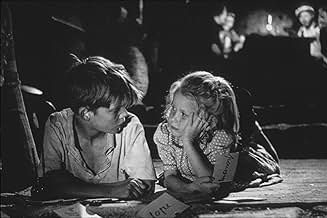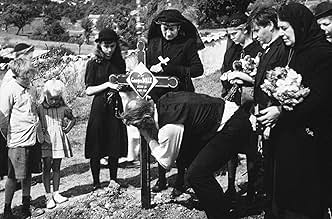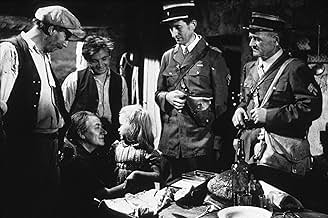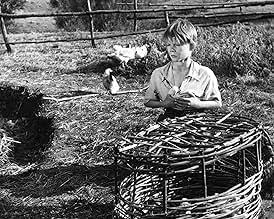ÉVALUATION IMDb
8,0/10
14 k
MA NOTE
Une jeune française devenue orpheline après un raid aérien nazi devient amie avec le fils d'un fermier pauvre. Ensemble, ils tentent d'accepter les réalités de la mort.Une jeune française devenue orpheline après un raid aérien nazi devient amie avec le fils d'un fermier pauvre. Ensemble, ils tentent d'accepter les réalités de la mort.Une jeune française devenue orpheline après un raid aérien nazi devient amie avec le fils d'un fermier pauvre. Ensemble, ils tentent d'accepter les réalités de la mort.
- Nommé pour 1 oscar
- 8 victoires et 2 nominations au total
Marcel Mérovée
- Raymond Dollé
- (as Pierre Merovée)
Denise Péronne
- Jeanne Gouard
- (as Denise Perronne)
Marie-Pierre Casey
- Infirmière
- (uncredited)
André Enard
- Le premier gendarme
- (uncredited)
Marcelle Feuillade
- La mère de Paulette
- (uncredited)
Roger Fossey
- Le père de Paulette
- (uncredited)
Histoire
Le saviez-vous
- AnecdotesIn a television interview ("Vivement Dimanche Prochain", France 2, 17 April 2005) Brigitte Fossey, who played the little Paulette, revealed that the film had originally been shot as a short, and then it was later decided to extend it into a feature film. Unfortunately she had lost her milk teeth and Georges Poujouly (who plays the boy Michel) had had his hair cut to play in Nous sommes tous des assassins (1952). So, in many scenes of the movie Paulette has false teeth and Michel is wearing a wig.
- GaffesThe poor parents are killed by a Focke-Wulf 190. This kind of plane didn't exist at the moment of the "battle of France" in May and June 1940.
- Générique farfeluThere are two alternate opening credits:The main credit starts with a story book and a female hand opens the book to reveal the credits. The alternate still has the same book but this time we are introduced to the two main characters who are sitting by a lake. In this version, Michel's hand is turning the page and in between the scenes he tells Paulette that he's going to tell a story.
- ConnexionsFeatured in Le ciné-club de Radio-Canada: Film présenté: Jeux interdits (1959)
Commentaire en vedette
I am really drawn to art that makes clean choices about messy things in order to deliver the richness of the mess cleanly.
Its a complicated set of tradeoffs, part abstracting things away, part enriching or amplifying things. Cinema is different than any other art because nominally we presume we are seeing reality. The people and things we see are real and the situations seem real.
But what we actually get is refined. There are two pleasures to such projects. One is the inhaling of the world we are presented with, then living with it as it commingles with our blood. The other is a sort of external appreciation of what choices were made, how expertly the arrows were made, and what craft there was in how we were tracked and captured.
This is a wonderful film in both respects and likely will stay with you dually for the rest of your life. Clean and messy.
One of the messes is accidental, as is probably true in most real art. The story is truncated abruptly because funding was. If you didn't know that, you might be amazed at how adroitly this storyteller dropped the narrative to keep us in the story once it has ended. And you might marvel at how appropriate that is, given the girl's own loss of story.
The nominal threads are about losses and the superficialities of religion to cover them. This is wrapped in an evocation of dear childhood, innocence, deep bonds, impulsive large projects. And of course, adults who have no idea of the real world nor appreciation for the bonds to it. We can get all this because the ordinary skills (acting, writing, staging) are performed so well that they get out of the way.
(However, along the way we become aware that the filmmaker murders a finally twitching puppy before our eyes.)
I'd like to highlight the external view, the one that looks as what is refined and what leavened. Simplified in story thread and child's perspective. Enriched in emotion, engagement and unexpected shape. Its sweet and dark both. Its emotionally casual and deeply affecting both. Its both distinctly French and universal, something that is rare in my experience. Bresson can't touch this.
Ted's Evaluation -- 3 of 3: Worth watching.
Its a complicated set of tradeoffs, part abstracting things away, part enriching or amplifying things. Cinema is different than any other art because nominally we presume we are seeing reality. The people and things we see are real and the situations seem real.
But what we actually get is refined. There are two pleasures to such projects. One is the inhaling of the world we are presented with, then living with it as it commingles with our blood. The other is a sort of external appreciation of what choices were made, how expertly the arrows were made, and what craft there was in how we were tracked and captured.
This is a wonderful film in both respects and likely will stay with you dually for the rest of your life. Clean and messy.
One of the messes is accidental, as is probably true in most real art. The story is truncated abruptly because funding was. If you didn't know that, you might be amazed at how adroitly this storyteller dropped the narrative to keep us in the story once it has ended. And you might marvel at how appropriate that is, given the girl's own loss of story.
The nominal threads are about losses and the superficialities of religion to cover them. This is wrapped in an evocation of dear childhood, innocence, deep bonds, impulsive large projects. And of course, adults who have no idea of the real world nor appreciation for the bonds to it. We can get all this because the ordinary skills (acting, writing, staging) are performed so well that they get out of the way.
(However, along the way we become aware that the filmmaker murders a finally twitching puppy before our eyes.)
I'd like to highlight the external view, the one that looks as what is refined and what leavened. Simplified in story thread and child's perspective. Enriched in emotion, engagement and unexpected shape. Its sweet and dark both. Its emotionally casual and deeply affecting both. Its both distinctly French and universal, something that is rare in my experience. Bresson can't touch this.
Ted's Evaluation -- 3 of 3: Worth watching.
- tedg
- 11 sept. 2006
- Lien permanent
Meilleurs choix
Connectez-vous pour évaluer et surveiller les recommandations personnalisées
- How long is Forbidden Games?Propulsé par Alexa
Détails
- Date de sortie
- Pays d’origine
- Site officiel
- Langue
- Aussi connu sous le nom de
- Forbidden Games
- Lieux de tournage
- sociétés de production
- Consultez plus de crédits d'entreprise sur IMDbPro
Box-office
- Brut – États-Unis et Canada
- 19 889 $ US
- Fin de semaine d'ouverture – États-Unis et Canada
- 4 316 $ US
- 26 avr. 2015
- Brut – à l'échelle mondiale
- 19 889 $ US
- Durée1 heure 26 minutes
- Couleur
- Rapport de forme
- 1.37 : 1
Contribuer à cette page
Suggérer une modification ou ajouter du contenu manquant

Lacune principale
By what name was Jeux interdits (1952) officially released in India in English?
Répondre

























